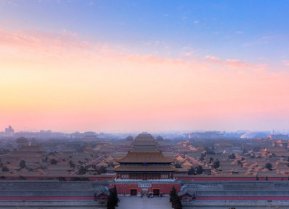Rep. Bi-khim Hsiao: Taiwan’s Resilience Shows the Power of Freedom and Democracy
"Taiwan is under tremendous pressure against China’s pervasive military, economic, and political coercion. Clear and concrete support from the United States and like-minded countries is more critical than ever."
October 10 marks the 109th birthday of the Republic of China (Taiwan). We invite friends from around the world to celebrate the founding of this unique and special sovereign nation. Also, we would like to take the opportunity to reflect on what freedom and democracy mean to us, as individuals, communities, and as global citizens with a shared destiny.
This year, as countries around the world continue to fight against the coronavirus pandemic, along with its international political and economic challenges, Taiwan stands out as a successful model and important contributor on the path to recovery. In August, Secretary of Health and Human Services Alex Azar II visited Taiwan to recognize Taiwan’s global health leadership and to underscore in his words, “our shared belief that free and democratic societies are the best model for protecting and promoting health.” Indeed, Taiwan’s resilience is built by a diligent and democratic society.
Meanwhile, the fast-evolving geostrategic environment throughout the Indo-Pacific region has further complicated the status quo across the Taiwan Strait. For some time now, China’s intensified diplomatic assaults and military threats against Taiwan have not only undermined cross-strait stability but also challenged its democracy.
Standing on the frontline of defense against China’s growing military intimidation, Taiwan will proactively pursue asymmetrical capabilities to deter the People’s Liberation Army’s aggression and protect its hard-earned democratic way of life. We are grateful that the United States has upheld its steadfast commitment to Taiwan’s security based on the Taiwan Relations Act and the Six Assurances. We thank the U.S. administration for regularizing arms sales to Taiwan, including the F-16V fighter jets which help boost our ability to defend Taiwan’s surrounding airspace against the near-daily intrusions of the PLA’s warplanes. Faced with formidable defense challenges in the Indo-Pacific region, Taiwan will also continue to seek security cooperation with the United States.
On the economic front, Taiwan became the ninth-largest trading partner of the United States during the first half of the year, epitomizing the significance of the U.S-Taiwan economic partnership. To further enhance bilateral trade and economic cooperation, President Tsai Ing-wen has announced measures to remove market access barriers in hope of deepening and expanding trade and economic relations. A Bilateral Trade Agreement will create the necessary infrastructure to deepen the already significant trade relationship between our two economies and bolster the security of supply chains for both sides.
As a responsible member of the global community, Taiwan has actively contributed its strengths to areas such as humanitarian assistance and public health. Taiwan’s success and contributions in the fight against the coronavirus pandemic has once again highlighted the need to include Taiwan in international organizations such as the World Health Organization. In addition to sharing best practices with other countries, Taiwan has donated millions of face masks, personal protective equipment and medical devices to over eighty countries. Taiwan deserves a seat in the upcoming World Health Assembly.
In September, we welcomed Under Secretary of State for Economic Growth, Energy, and the Environment Keith Krach to Taiwan as the highest-level State Department official since 1979. This visit not only highlights the robust and enduring partnership between Taiwan and the United States but also paves a solid foundation for future discussion on important topics such as secure technology, energy infrastructure, and global supply chain realignment. Among significant projects in the U.S.-Taiwan partnership are a joint declaration on 5G security and a framework to strengthen infrastructure and market building cooperation, enhancing our digital cooperation and providing tremendous economic opportunities for the future.
For decades, the U.S. Congress has been a driving force for a strong U.S.-Taiwan relationship. Taiwan has been blessed by consistent and strong bipartisan congressional support. We are grateful for the recent passage of a number of timely and important pieces of legislation, including the Taiwan Travel Act in 2018 and the Taiwan Allies International Protection and Enhancement Initiative Act of 2019. We are also thankful for the 161 members of the House of Representatives and 50 senators who sent joint letters to the U.S. Trade Representative, supporting a bilateral trade agreement with Taiwan.
Freedom and democracy are part of Taiwan’s DNA. They not only constitute the fundamental and common values that connect the island republic to the international community but also tie together Taiwan and the United States. Taiwan will continue to shine the light of freedom and democracy across the globe. Taiwan will bolster cooperation with the United States and other free-loving countries to jointly protect the rules-based international order and safeguard peace, stability, and prosperity in the Indo-Pacific region.
The Double Tenth Day marks an appropriate occasion to validate Taiwan’s continuing, resilient efforts to combat the global coronavirus pandemic and uphold those universal democratic values in the darkest times. Let us mark this auspicious occasion with a joint commitment that Taiwan and the United States will move forward together, as friends and reliable partners.
Bi-khim Hsiao serves as Representative of the Taipei Economic and Cultural Representative Office (TECRO), Washington, DC, U.S.A. Follow her on Twitter: @Bikhim.
Image: Reuters


